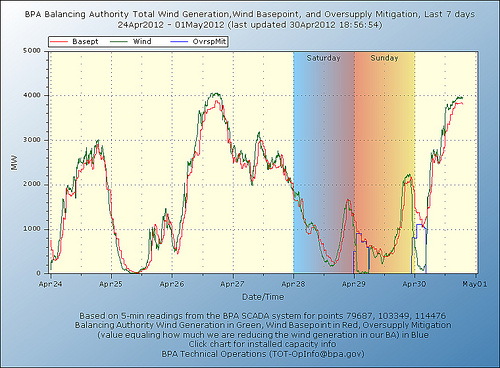forum
library
tutorial
contact

BPA's defenders in Congress Mobilize Again
to Insulate Power Generator from Federal 'Micro-Management'
by Charles Pope
The Oregonian, June 13, 2012
|
the film forum library tutorial contact |

|
BPA's defenders in Congress Mobilize Again
by Charles Pope
|
In a six-page memo this spring, Chu said BPA and the other regional power generators should devote more attention and money
to upgrading transmission lines, boosting the variety of renewable power, energy efficiency and even cyber security.
 WASHINGTON - The Obama Administration is finding out what every president, regardless of party, has learned the hard way over the last 35 years: Don't mess with the Power Marketing Administration and especially not with Bonneville Power.
WASHINGTON - The Obama Administration is finding out what every president, regardless of party, has learned the hard way over the last 35 years: Don't mess with the Power Marketing Administration and especially not with Bonneville Power.
That message was delivered again this week in response to a proposal by Energy Secretary Steven Chu to alter the way BPA and the three other federal power generators do business. In a six-page memo this spring, Chu said BPA and the other regional power generators should devote more attention and money to upgrading transmission lines, boosting the variety of renewable power, energy efficiency and even cyber security.
The response was immediate and furious. It continues unabated. Dozens of lawmakers, mostly from the West and Northwest wrote or signed letters. In a House hearing in April, Chu's edict was widely condemned.
"The electric bills of families and small businesses ... should not be increased because the federal energy secretary would like to toy and experiment with various energy schemes and mandates," said Rep. Doc Hastings, R-Wash., who chairs the Natural Resources Committee.
On Monday, a bipartisan collection of 166 lawmakers - including Sens. Ron Wyden and Jeff Merkley as well as Reps. Greg Walden, Peter DeFazio and Kurt Schrader - wrote Chu to complain again.
The letter accuses Chu of a "top-down approach" and urges him collaborate.
The unified negative response underscores BPA's political power, even though it is a tiny agency largely unknown outside the region.
Congress created the BPA in 1937 fulfilling a Franklin Roosevelt promise to electrify the nation. The pledge was especially strong in the Northwest, which was largely undeveloped yet had enormous potential because of the Columbia and Snake rivers.
The BPA is a federal agency but doesn't receive direct federal funds. It operates largely as a stand-alone business but must repay federal loans that financed construction of dams and power lines in the Northwest. It also is required to set rates that cover the cost of operating the system and interest payments, a framework that makes power in the Northwest among the cheapest in the nation.
Those rates mean that lawmakers who agree on little else rally to BPA's defense at the slightest indication of outside tampering.
In the latest example, conservative Republican Sen. Orrin Hatch of Utah signed the letter as did Merkley, one of the Senate's most liberal members.
The collaboration isn't as odd as it seems.
Power is the Northwest's local franchise and BPA is the dominant nameplate. Like cars in Michigan and wheat in Kansas, BPA is woven deeply into the fabric of the Northwest. Lawmakers from the region see themselves as its board of directors and protectors, and they take the role very seriously.
Merkley is taking an adversarial position even though he's one of the Senate's leading advocates for many of the things Chu wants to accomplish.
"It's a good list of things to be working on and I'm very supportive of them holding the conversation," Merkley said when asked to reconcile the positions that seem at odds. "We just want to make sure it's a conversation, a consultation ... not a situation where the federal government starts micro-managing how they have to operate."
In that sense, Merkley is simply an echo from the past.
Former Oregon Sen. Mark Hatfield, a Republican, once explained that lawmakers could "threaten the Department of Energy secretary, or let them know we were unhappy and give them a scowl on our face, in order to get our way on Bonneville."
View full sizeBruce Ely/The Oregonian Cheap power produced by BPA's turbines triggered the region's economic boom and created an institution that is fiercely defended by politicians of all parties and ideologies.
That legacy includes Sen. Ron Wyden, Oregon's senior Democrat. In 2006, when the Energy Department proposed siphoning $1 billion in profits from BPA over 10 years, Wyden called it "economic poison." Moreover, at a 2006 hearing, he told then-Energy Secretary Samuel Bodman who'd been unanimously confirmed a year before, that he would have blocked his nomination if he had known then of the department's plans.
Like other proposals, it failed. That seems to be happening this time. The Department of Energy declined repeated requests for comment, but lawmakers and lobbyists alike say Chu's proposal is doomed and that Congress has multiple tools to make sure that remains the case.
In an interview on Tuesday, Wyden was more measured but no less resolute in his defense of BPA.
"Sensible power policy in our part of the world is about bringing folks together and trying to find some common ground," he said. "There are certainly substantive issues as well. But to just do this without an opportunity for folks in the region to be heard is, I think, a serious mistake."
learn more on topics covered in the film
see the video
read the script
learn the songs
discussion forum
